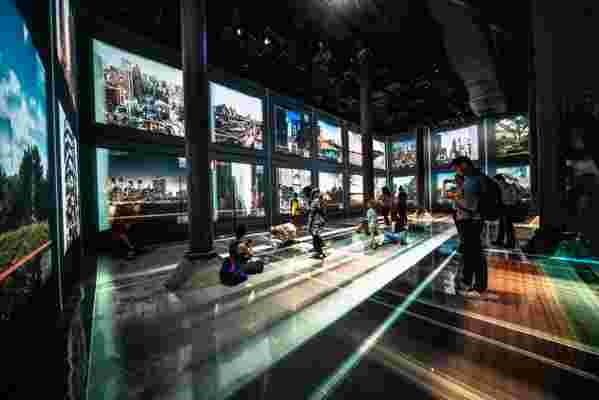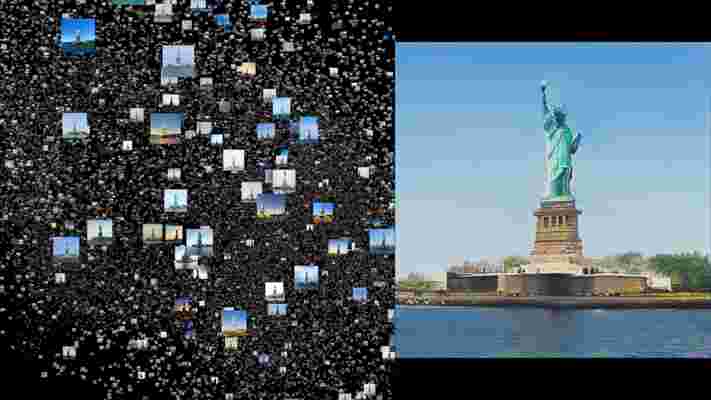As a child, Refik Anadol would joyously envisage alternate spatial realities: a version of his bedroom without a ceiling, another version without a floor. So it’s fitting that the Istanbul-born, Los Angeles–based data artist spends his grown-up days ideating at the vanguard of new media where architecture, art, and technology converge. Anadol’s latest project, entitled Machine Hallucination , is an AI-generated vision of New York City. The immersive installation serves as the first Manhattan-based exhibition organized by digital art space ARTECHOUSE, which has recently opened its new outpost below Chelsea Market, which is located in and named for the popular neighborhood.
ARTECHOUSE was cofounded by Tatiana Pastukhova and Sandro Kereselidze in 2015 as a platform for the development and presentation of new media projects like Machine Hallucination . Noting the lack of resources available to artists experimenting with sophisticated technologies in their work, the husband-and-wife team established ARTECHOUSE to be what Pastukhova calls “a home where new media artists are free to create and show their work without limitations.”

Scenes of the city are pulled from targeted archival images and Instagram posts without human subjects for privacy.
Positioned within the subterranean walls of the 6,000-square-foot boiler room beneath Chelsea Market’s main concourse, Machine Hallucination is the culmination of Anadol’s tenacious research into generative adversarial networks (GANs), a kind of machine-learning technology engineered to realize simulated realities derived from “real-world” imagery. “These networks train each other, and their dialogue can be captured to create a story,” Anadol explains. “So let’s say it’s the near future. A machine has taken over a space, and dreams about the city it’s inside. In this case, that city is New York. What would that machine’s dream look like?”
With over 100 million public photographs of New York—the largest mass of raw data gathered for an artwork to date—Anadol created an algorithm trained to target archival images and Instagram posts without human subjects in protection of their privacy. The machine subsequently processed a subset of 8 million pictures across a mind-bending 1,000 dimensions, and what Anadol refers to as “enormous, unimaginable worlds” thereafter. Think an otherwise inconceivable, never-before-seen interpretation of New York, but which is rooted in genuine human snapshots of the city’s innumerable landmarks.
Anadol, who participated in Google’s Artists and Machine Intelligence Program, is among the first generation of visual artists to create with AI. Which is exactly why the Turkish maverick was tapped by ARTECHOUSE, a cutting-edge enterprise outfitted with the forefront technologies essential to producing immersive, sensory works of digital art. ARTECHOUSE’s radical ethos eschews the traditional museum format by inviting viewers to step inside the artwork, rather than away from it—“a kind of engagement that most people have never experienced,” Pastukhova notes.

Various images and social media posts come together in the formation of New York's Statue of Liberty.
Pastukhova and Kereselidze pinpointed Chelsea Market’s subsurface sanctum for its prime location in the gallery district of Manhattan, and they plan to juxtapose the building’s late-19th-century heritage with a roster of contemporary amenities. According to Pastukhova, “ARTECHOUSE NYC will be the world’s first art space to integrate L-ISA Immersive Hyperreal Sound technology with 32 separate channels,” as well as “the largest seamless megapixel count in the world.”
But it’s not all about “boring technology or cold algorithms,” adds Anadol, who hopes that Machine Hallucination will provide a profound and thought-provoking respite from the Chelsea Market bustle overhead. “I want people to come down and temporarily change their pace. To be a little more meditative and mindful, even if for a brief period of time.”
The ultimate resource for design industry professionals, brought to you by the editors of Architectural Digest

Machine Hallucination will be Anadol’s second collaboration with ARTECHOUSE, which opened its first location in Washington, D.C., in 2017, followed by Miami Beach in 2018.
